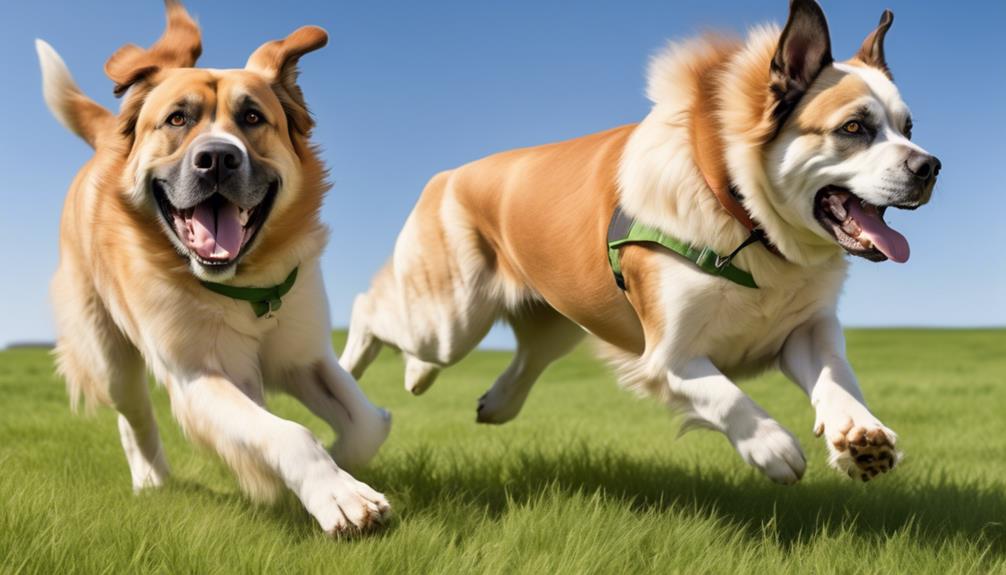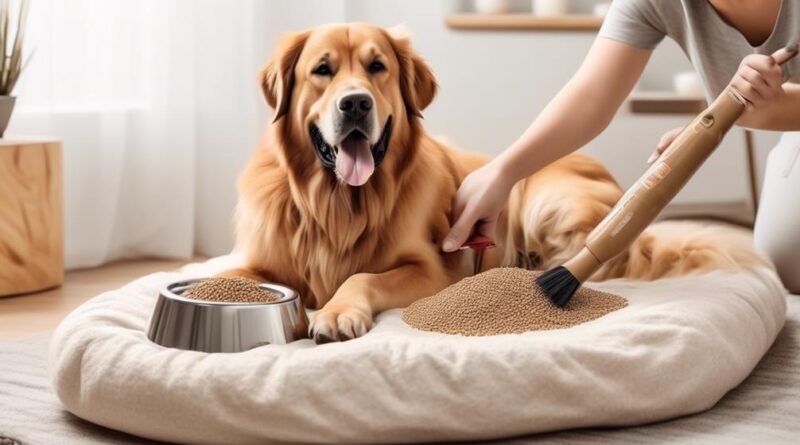3 Tips for Large Breed Dog Allergy Management
If you've ever found yourself caught in a sudden rainstorm without an umbrella, you know how quickly things can become uncomfortable.
Dealing with allergies in large breed dogs can be just as unpredictable and uncomfortable. You've probably experienced the frustration of watching your furry friend suffer from itchy skin, constant scratching, and other allergy symptoms.
But don't worry, there are ways to manage and alleviate these issues. By implementing a few simple tips, you can help your large breed dog find relief and enjoy a happier, healthier life.
Understanding Allergies in Large Breeds
If you have a large breed dog, understanding their allergies is essential for their health and well-being. Genetic predisposition plays a significant role in your dog's susceptibility to allergies. Certain breeds, such as Golden Retrievers, Boxers, and Bulldogs, are more prone to developing allergies due to their genetic makeup. Environmental factors, such as pollen, dust mites, and mold, can also trigger allergic reactions in large breed dogs.
It's important to be aware of the symptoms of allergies in your dog, which can include excessive itching, redness of the skin, ear infections, and gastrointestinal issues.
When it comes to understanding the symptoms, it's crucial to observe your dog's behavior and physical reactions. If you notice persistent scratching, licking, or chewing on certain parts of their body, it could indicate an allergic reaction. Additionally, skin inflammation, hair loss, and recurring ear infections are common signs of allergies in large breed dogs. Understanding these symptoms will help you seek timely veterinary care and explore treatment options.
Treatment options for allergies in large breed dogs may include antihistamines, corticosteroids, or allergy shots, depending on the severity of the allergic reaction. Your veterinarian can provide guidance on the most suitable treatment plan for your dog. In some cases, dietary modifications or specialized hypoallergenic diets may be recommended to alleviate your dog's allergic symptoms.
Identifying Common Allergy Triggers
Understanding the genetic predisposition of your large breed dog to allergies will help in identifying common allergy triggers such as pollen, dust mites, and mold. Identifying environmental and food allergy triggers is essential for effective allergy management.
Here are some common allergy triggers to look out for:
- Pollen: Pollen from trees, grasses, and weeds can cause allergic reactions in large breed dogs, especially during the spring and fall months.
- Dust Mites: These microscopic creatures thrive in household dust and can trigger allergic reactions in dogs. Regular cleaning and dusting can help reduce exposure.
- Mold: Mold spores in the air and on surfaces can lead to allergy symptoms in large breed dogs. Keep an eye out for damp areas in your home.
- Food Allergens: Proteins from common ingredients such as beef, chicken, dairy, and grains can be food allergy triggers in large breed dogs. Pay attention to any adverse reactions after mealtime.
Creating an Allergy-Friendly Environment

To create an allergy-friendly environment for your large breed dog, focus on minimizing exposure to common triggers such as pollen, dust mites, and mold. Start by using allergy-friendly products such as hypoallergenic bedding and air purifiers to reduce allergens in your dog's environment. Consider investing in a high-quality vacuum with a HEPA filter to effectively remove pet dander and other allergens from carpets and upholstery. Regularly wash your dog's bedding and toys in hot water to eliminate dust mites and other potential irritants. Additionally, choose natural cleaning products that are free of harsh chemicals and fragrances to avoid triggering allergies in your dog.
Environmental modifications can also play a crucial role in creating a comfortable space for your large breed dog. Keep your home well-ventilated to prevent the buildup of indoor allergens, and consider using a dehumidifier to control mold growth. Regularly groom and bathe your dog to reduce the amount of dander and pollen they carry into the house. If your dog spends time outdoors, wipe their paws and coat with a damp cloth when they come inside to minimize the transfer of outdoor allergens.
Proper Grooming and Bathing Techniques
Using proper grooming and bathing techniques is essential for managing allergies in your large breed dog. By following these tips, you can ensure that your dog's coat and skin are healthy, which can help reduce allergens and minimize allergic reactions.
Coat maintenance and shedding control: Regular brushing is crucial for large breed dogs to minimize shedding and reduce the amount of dander in the environment. Use a high-quality de-shedding tool to remove loose fur and prevent it from spreading around your home. This can help decrease the allergens that may trigger allergic reactions.
Skin care and moisturizing techniques: Bathing your dog with a hypoallergenic shampoo can help remove allergens from their skin and coat. Additionally, moisturizing your dog's skin with vet-recommended products can help maintain a healthy skin barrier, reducing the risk of allergic reactions. Be sure to consult with a veterinarian to determine the best bathing and moisturizing routine for your specific breed and individual dog.
Ear and paw care: Regularly clean your dog's ears and paws to prevent the buildup of allergens and bacteria. Use a gentle ear cleaning solution and wipes to keep these areas clean and reduce the risk of skin irritation and allergic reactions.
Professional grooming: Consider scheduling regular professional grooming sessions for your large breed dog. Professional groomers can provide specialized treatments, such as de-shedding baths and skin moisturizing, to help manage allergies and promote overall skin and coat health.
Importance of High-Quality Nutrition

Feeding your large breed dog high-quality nutrition is essential for maintaining their overall health and minimizing the risk of allergic reactions. Nutritional supplements and breed-specific diets play a vital role in managing your dog's allergies. Large breed dogs have specific nutritional requirements that must be met to support their growth and development while reducing the potential for allergic responses.
Nutritional supplements can provide additional support for your large breed dog's immune system and overall health. Omega-3 fatty acids, for example, can help reduce inflammation and support healthy skin and coat, which are crucial for managing allergies. Additionally, supplements such as probiotics can aid in maintaining a healthy gut microbiome, which is linked to immune system function and can help reduce the risk of food sensitivities and allergies.
Breed-specific diets are formulated to meet the unique nutritional needs of specific large dog breeds. These diets take into account the breed's size, activity level, and potential health concerns, including allergies. By providing a diet tailored to your dog's breed, you can help minimize the risk of allergic reactions triggered by inappropriate or insufficient nutrition.
When selecting food and supplements for your large breed dog, it's essential to consult with your veterinarian to ensure that you're meeting all of your dog's nutritional needs while addressing any specific allergy concerns. By prioritizing high-quality nutrition, you can help support your large breed dog's overall health and well-being while minimizing the risk of allergic reactions.
Allergy Testing and Veterinary Consultation
Consider scheduling an allergy testing and veterinary consultation to accurately identify and address your large breed dog's specific allergens and health needs. This proactive approach can provide valuable insights into managing your dog's allergies and overall well-being.
- Allergy Testing: Allergy testing can help pinpoint the specific triggers causing your dog's allergic reactions, whether it's environmental factors like pollen or dust, or food-related allergens. This information is crucial for developing an effective treatment plan.
- Veterinary Consultation: Consulting with a veterinarian is essential for interpreting allergy test results and determining the best course of action for your dog. A veterinarian can also provide guidance on allergy treatment options and dietary restrictions tailored to your dog's specific needs.
- Allergy Treatment Options: Once the allergens are identified, your veterinarian can recommend suitable treatment options, which may include allergy medications, immunotherapy, or specialized shampoos to manage skin allergies.
- Dietary Restrictions: In cases of food allergies, your veterinarian can advise on appropriate dietary restrictions and may recommend hypoallergenic dog food or specific ingredient exclusions to alleviate your dog's symptoms.
Exercise and Outdoor Allergy Management

After identifying your large breed dog's specific allergens through allergy testing and veterinary consultation, it's important to address exercise and outdoor allergy management to ensure your dog's well-being. Outdoor play can significantly impact your dog's allergies. Consider choosing outdoor play areas wisely, such as avoiding grassy fields during high pollen seasons. Opt for playing in well-maintained, pollen-free areas or consider indoor play options during peak allergy times.
It's also important to keep an eye on the weather and pollen counts in your area to plan outdoor activities accordingly.
When planning your dog's exercise routine, try to schedule activities during times when pollen levels are lower. Early mornings or late evenings are typically better for outdoor exercise as pollen levels tend to be lower at these times. Additionally, after outdoor play, consider wiping down your dog's coat and paws to remove any potential allergens. This simple step can help prevent allergens from being tracked into your home, reducing your dog's exposure.
Incorporating regular grooming into your dog's routine can also help manage outdoor allergies. Bathing your dog with a hypoallergenic shampoo after outdoor play can help remove allergens from their coat, reducing the likelihood of allergic reactions. Additionally, maintaining a clean living environment by regularly vacuuming and washing your dog's bedding can further minimize exposure to outdoor allergens.
Monitoring and Managing Allergy Symptoms
To effectively monitor and manage your large breed dog's allergy symptoms, it's crucial to stay attentive to any changes in their behavior and physical condition. Allergy symptom tracking is essential in understanding the patterns and triggers of your dog's allergies. Keep a detailed record of any symptoms such as itching, redness, swelling, or gastrointestinal issues. This tracking will help you and your veterinarian to identify the specific allergens affecting your dog and develop an appropriate management plan.
In addition to tracking symptoms, allergy medication management plays a vital role in keeping your large breed dog comfortable. Work closely with your veterinarian to ensure your dog is on the right medication and dosage. It's important to administer medications as prescribed and to monitor their effectiveness. If you notice any adverse effects or lack of improvement, consult your veterinarian promptly to adjust the treatment plan.
Regular check-ups with the vet are crucial for monitoring your dog's allergy symptoms and adjusting the management plan as needed. Through consistent communication and observation, you can ensure that your large breed dog receives the best possible care for their allergies.
Frequently Asked Questions
Can Large Breed Dogs Develop Allergies as They Get Older?
As your large breed dog ages, they can develop allergies. Allergy testing can identify triggers, and treatment may involve dietary changes and supplements. Consult your vet for personalized advice on managing your dog's allergies.
Are There Any Specific Breeds That Are More Prone to Allergies?
Some specific breeds are more prone to allergies due to genetic factors and allergens. Allergy susceptibility varies among breeds, with some more predisposed to skin, food, or environmental allergies. Factors like coat type and living environment can also influence allergies.
How Do I Know if My Large Breed Dog's Allergies Are Seasonal or Year-Round?
You can determine if your large breed dog's allergies are seasonal or year-round through allergy testing. Look for symptoms like itching, sneezing, and redness. Monitor behavior changes and consider environmental triggers such as pollen or dust.
Can Allergies in Large Breed Dogs Be Managed Without Medication?
You can manage allergies in large breed dogs without medication by taking a holistic approach. Focus on behavioral changes and make dietary adjustments. This non-medication management can help alleviate symptoms and improve your dog's overall well-being.
Are There Any Natural Remedies for Managing Allergies in Large Breed Dogs?
For managing allergies in large breed dogs, you can try natural remedies and a holistic approach. Consider dietary supplements and herbal remedies to alleviate symptoms. Always consult with your vet to ensure these options are safe for your pup.
Conclusion
So, take care of your large breed dog's allergies by understanding their triggers, creating an allergy-friendly environment, and providing proper grooming and nutrition.
Don't forget to consult with a veterinarian for allergy testing and management strategies.
With these tips, you can help your furry friend live a more comfortable and healthy life.
